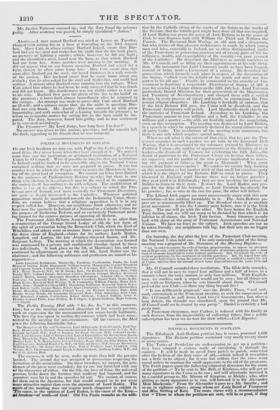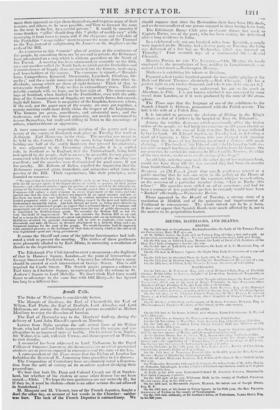POLITICAL MOVEMENTS IN SCOTLAND.
The Edinburgh Anti-Reform petition has, it seems, procured 1,628 signatures. The Reform petition contained very nearly twenty times as many names.
The Tories of Perthshire are endeavouring to get up a petition : they have adopted a curious mode of circulating it through the country. It will be made to speed from parish to parish, somewhat after the fitshion of the fiery cross of old,—which indeed it resembles not a little in its object ; for it was but seldom that the cross went round unless to summon the small oppressors. to the aid of the great one. The Perth papers quote the following whimsical directions for the route of the petition—" To be sent to Mr. Bell, at Kinfauns, who will get as many signatures in the Carse as he can ; and will afterwards forward it by a careful person to Mr. Murray of Simprim, at Meigle ; who, after getting as many signatures as he can, will forward it to Sir Alexander Muir Mackenzie." From Sir Alexander it goes to a Mr. Smythe ; and so on to eighteen others ; among whom are Lady Baird of Ferntower and Miss Stirling of Keir. The route closes with a recommendation that " Those to whom the petitions are sent, will-be so good, if . thee
meet their approval, to sign them themselves, and to get as many of their tenants, and others, to do so as possible, and' hen to forward the same to the next in the list, by a careful person." It would be amusing if some drunken " gillie" should drop this " pledge of meikle care" while conveying it from town to town, and if the eloquence and calf-skin of the Perthshire " respectables" went to amuse the trouts of the Ttunmel or the Tay, instead of enlightening St. James's or St. Stephen's on the evils of the Bill.
As a converse to this " eannie" plan of getting at the sentiments of the people, by consulting them one by one and in private, the Reformers have adventured on a step \Odell is without precedent on the North of the Tweed. .A. meeting has been summoned to assemble on the Kith, on a vast meadow called the North Inch, to which not the freeholders and Commissioners of Supply alone are invited, but the farmers, tradesmen, and householders of the county. The summons is signed—" Breadal- bane, Camperdown, Kinnaird, Abercromby, Lynedoch, Glenivon, Or- melie ;" and these noble names are followed by those of forty other in- dividuals, among which are those of eight tamers ! Think of that, in aristocratic Scotland ! Truly we live in extraordinary times. This ad- mirable example will, we hope, not be lost sight of. The county meet- ings of Scotland, when limited to the Freeholders, even with the addi- tion of the Commissioners of Supply, are not merely farces, but exceed- ingly dull farces. There is no quarter of the kingdom, however, where, if the real, not the paper men of the county, are once got together, a county meeting could more fairly claim the respect of the Legislature. The farmers are grave, considerate, and substantial men ; and the tradesmen, and even the lowest peasantry-, not merely accustomed to reason themselves, but readyand willing to listen to the ,_reasonings of others, whether friends or opponents.
A MOST numerous and respectable meeting of the gentry and yeo- manry of the county of Roxburgh took place on Tuesday last Nvcck at Jedburgh. Earl 3Iinto was in the chair. The meeting was meant to be held in the County hall ; but the room being found ineepable of holding one half of the sturdy Borderers that pressed for admission, it was adjourned to the Dissenting- church,—for it is a settled rule, in Scotland as in England, that the Parish-church, being built and upheld by the people, shall in no case he accessible for any purpose connected with their ordinary interests. The spirit of the meeting was excellent ; and the speeches were distinguished ter good sense, if not for novelty. Mr. Robson, of Kelso, repelled the imputation that the Reformers expected great, immediate, and miraculous relief from the passing of the Bill. Their expectations, like their principles, were founded on reason- ' We expect that its beneficial working will be soh as ere long to render it impos- sible fin- the meaner spirits „r the higher classes of st nrirl y to quarter all their junior branches and collateral relatives upon the lifetime or lax, raised by the laborious ex- ertions of the lower ranks of society. We assuredly expeet that a refinmed House of Commons will enforce a rigid economy in every department or the state, and take special care that the taxes they do levy are imposed in an equal manner, and not, as has been too much the case hitherto, with an evident intention to screen the great landed proprietor, while a part of every tithing earned by the poor and industrious tradesman is inexorably taken. Ant last, though not least, as being most oftimsive iii the eyes of an overburdened people, we expect that a reformed House of Commons will unsparingly cut oil' every pension which cannot bear the test of public discussion, and is sanctioned by Parliamentary grant. We consider the Reform Bill as but the 'very threshold of improvement. We do not cousider the 'Reform BM as an end, but as a mean for the attainment of a great and glorious end—as an instrument, by the skilful use of which the patriotic statesman will be able to eradicate every cause of discontent, and unite all classes in devoted attachment to a fatherly King, and a go- ternment anxious ibr the good of the people. We would therefore hail its approach with unmixed pleasure, as the harbinger of that state of society which is the cud of all wise legislation—good and cheap government."
It seems the Sheriff and some of the inferior functionaries had indi- cated a wish to prevent the meeting. The wishes of these gentlemen were pleasantly alluded to by Earl :pinto, in answering a resolution of thanks to the requisitionists.
The Edinburgh Pitt Club intend to erect a monment—the duplicate of that in Hanover Square, London—at the point of intersection of George Street and Frederick Street. Chantrey has advised that a statue should be erected at each intersection of George Street. One is still required for Castle Street. The Scotch papers propose a column to Earl Grey in Charlotte Square, to correspond with the column in St. Andrew's Square to Lord Melville. We don't think Earl Grey would figure to advantage in the same line with Old Harry—he has figured too long in a different line.



























 Previous page
Previous page